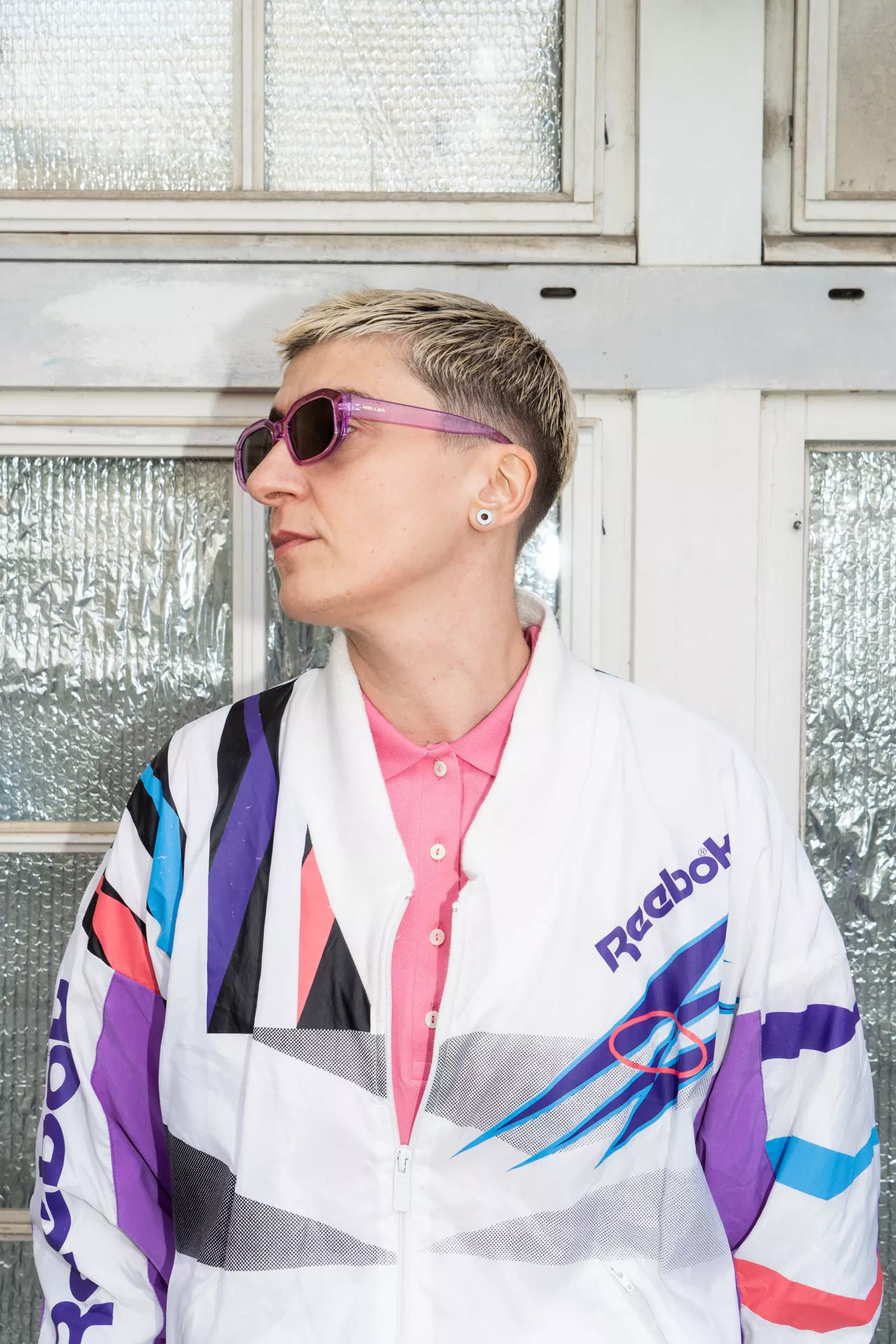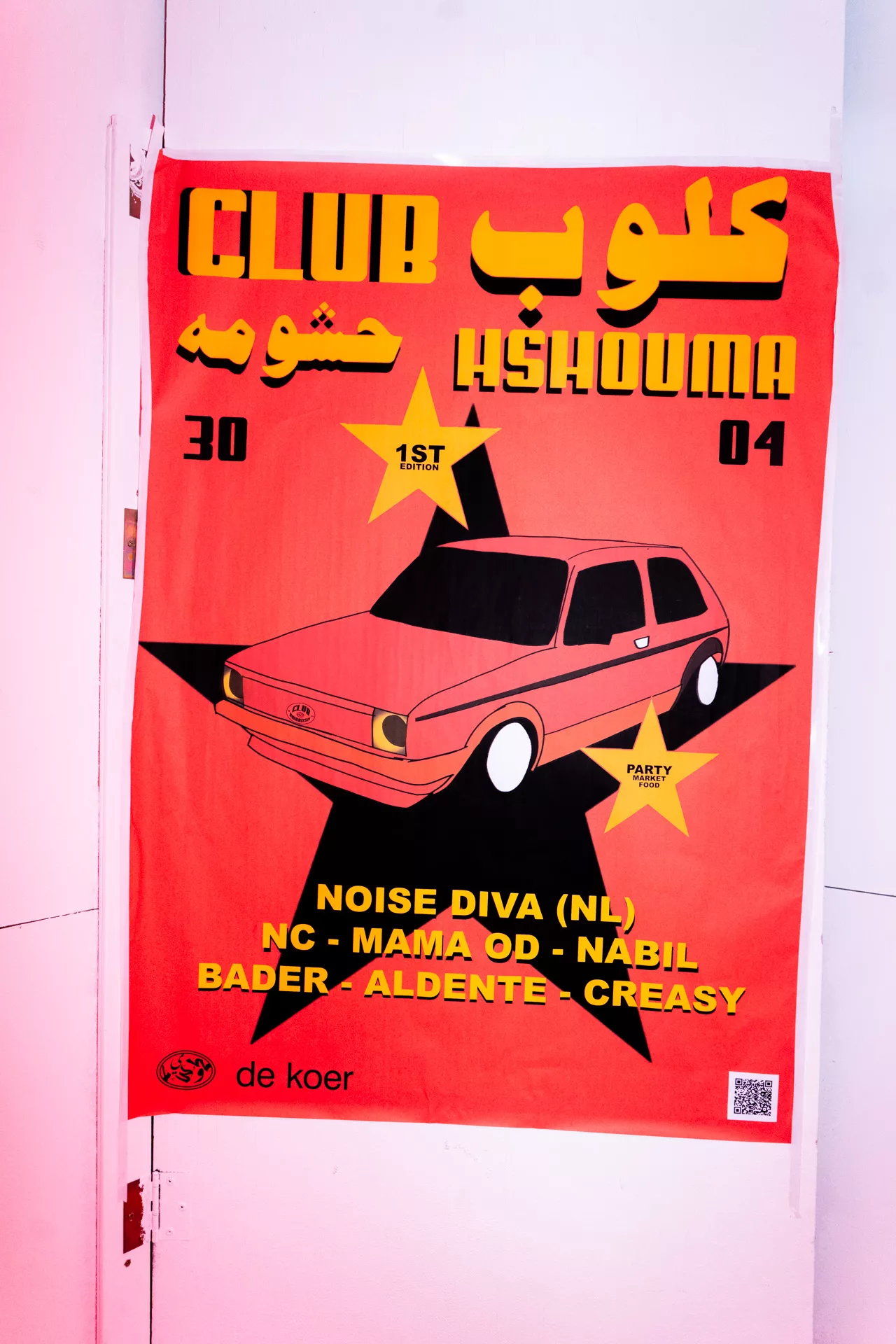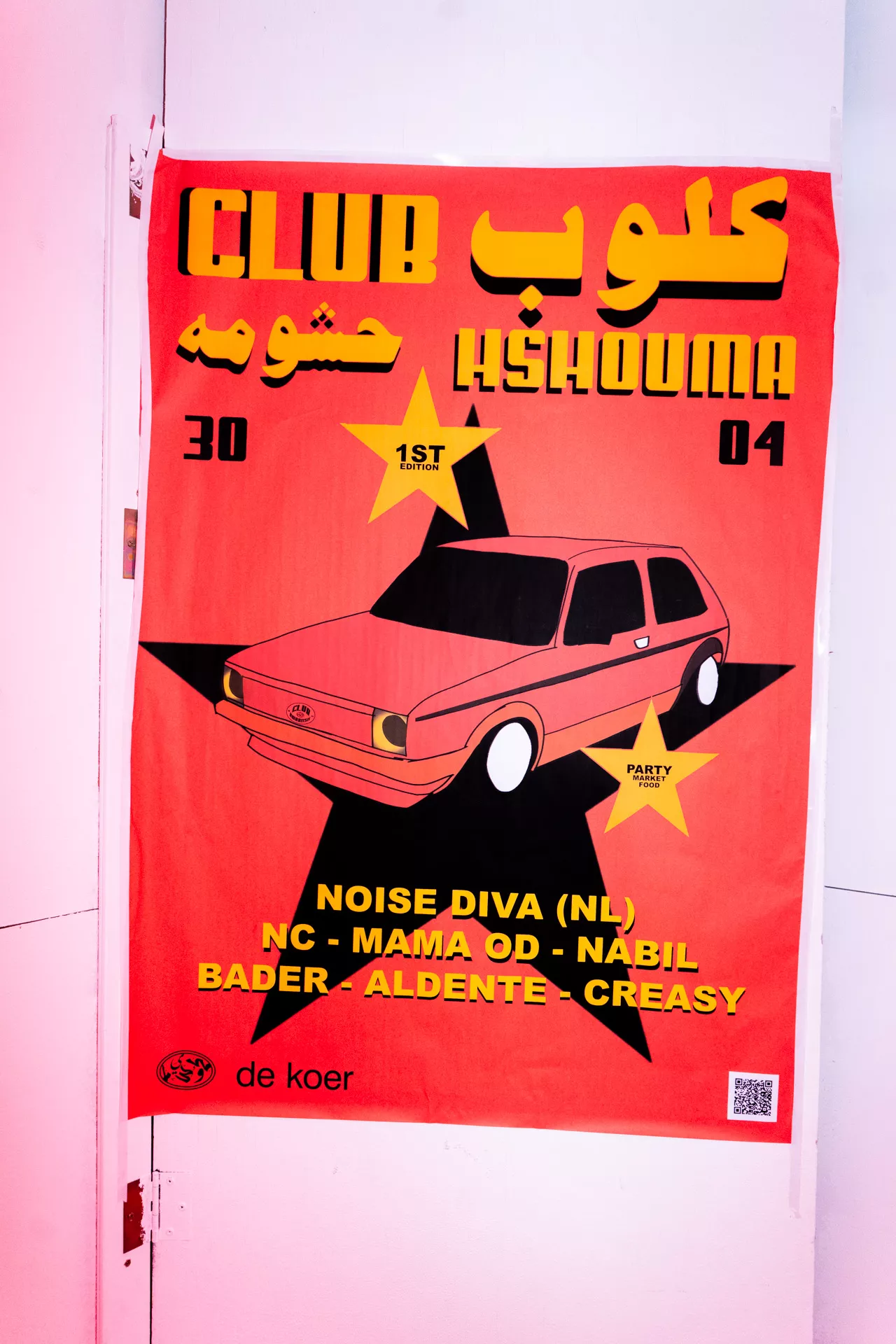In a festival landscape where brand activations increasingly focus on visibility alone, fritz-kola is taking a different route. With the launch of a long-term cultural initiative, the brand aims to genuinely contribute to the guest experience. Under the name fritz-kolab, it creates space for artists to co-create meaningful experiences at festivals and events.
Earlier this year, an open call for nightlife concepts was launched and your response was nothing short of inspiring. A professional jury, composed of nightlife experts alongside the fritz-kola and Listen Festival teams, was faced with the tough task of selecting a winner. After careful consideration of all submissions, Club Hshouma emerged as the standout project! More information about the party and free registration here.
I meet the driving forces behind Club Hshouma in their very own metaverse—a digital replica of the offices of Voem VZW. This socio-cultural organization was founded in the 1980s by teachers of Moroccan descent and continues to bring people together through art, culture, and social engagement. Lennart Thienpont, Voem’s general coordinator—also known as Acid Ponch—teams up with Bader Shahit to form the now-infamous Yalla Soundsystem. Bader is the founder of Yalla Worldwide, the umbrella brand from which Club Hshouma emerged. Also present are young guns Nabil Elmizziani and Selay Ovski aka SKANDAL. This is their story.






Hello everyone. Club Hshouma is a party by Yalla Worldwide. Tell us more about it?
Bader: Yalla Worldwide is a collective of musicians, DJs, and artists who don’t often get the chance to showcase their work or perform. I started Yalla Worldwide four years ago, during the first edition of the Gentse Feesten after the Covid pandemic. It began as a small party aimed at mobilizing young people. At a certain point, we started booking major artists from the MENA region (Middle East and North Africa), which was something completely new for Ghent. Since then, we’ve organized 43 events and built a solid following. Club Hshouma grew out of that, a party for and by young people, open and accessible to everyone.
Is club culture in Belgium accessible enough?
Bader: We weren’t allowed in. Let that sink in. We simply weren’t allowed. That’s why we created our own club.
Nabil: Either you just didn’t get in, or you had to bring along a few white girls, then suddenly you were allowed in. Over time, you might get to know someone: the bartender, the organizer, the bouncer… and then you could get in. But even then, you're still on the edge of the bubble, never at the core. Just last year, Dina Tersago ran a test on the Flemish TV channel VTM. Six clubs in Flanders and Brussels were visited by both white and black actors. While the white actors got in without issue, the black actors were turned away from five out of the six clubs, just minutes later.
Bader: These days, you see alternative collectives throwing around hipster buzzwords like “inclusivity” and “safe space,” but even there, men of color are turned away, seen as a threat to the so-called safe space. That’s sad, really. We just let everyone in. Sometimes we mock that toxic trend by staging little performances at the entrance, just to call out the absurdity of those door policies.
We weren’t allowed in. Let that sink in. We simply weren’t allowed. That’s why we created our own club.






How did you meet up with Yalla, Selay?
Selay: I met Bader and Lennart in 2022 when I was DJing for Slam Aleikum, an event organized by Voem and Hind Eljadid. I came in with my queer Brussels vibes and we instantly matched. Since then, I’ve played with them at a few Yalla Night events, bringing along my “Turxelloise touch”.
In recent years, Yalla has caught the attention of some pretty major venues and organizations, right?
Bader: Last year, I curated The Sound of the Belgian Underground for Different Class at Botanique. We also sold out Ancienne Belgique with Yalla Soundsystem, as part of the 60 Years of Moroccan Migration in Belgium program. For that show, we booked Issam, a major rapper from Morocco. And with Yalla Soundsystem, which is Lennart as his alter ego Acid Ponch, 5amaseen, and myself, we’ve been touring internationally. Coming up, we’re playing in cities like Tunis, Cairo, Beirut, and Riyadh.
What’s the idea behind Club Hshouma?
Bader: The core concept of Club Hshouma is Belgium. Everyone talks about their neighborhood, their province, but rarely about Belgium as a whole. Yet it’s such an interesting country, with so much happening in Wallonia, East Flanders, Antwerp… So we thought, let’s do something with our Belgium, something local, something cool. The first edition at De Koer, a venue at De Brugse Poort which is really at the core of the Ghent neighborhoods, sold out instantly and drew a super diverse crowd of all ages, especially people you wouldn’t normally see in a club setting. We’re inspired by the Notting Hill Carnival in London and its soundsystem vibe. That’s why we avoid fancy venues and go for more accessible spaces.
You’re throwing a full-blown block party during Listen Festival?
Nabil: Right! We want to bring together DJs from different quartiers across the country, to blend the musical tastes of all these neighborhoods, just like at an original block party. The music is going to be all over the map: R&B and hip-hop, dembow, baile funk, Miami bass, Jersey club, jungle, Baltimore club, amapiano, shaabi…
Lennart: Music from around the world, served right up!
Nabil: We like to introduce people to different drum patterns. First, we ease them in by playing edits, tracks they might recognize but flipped in totally new ways. Once their ears are warmed up, we start hitting them with the more unconventional rhythms. That’s a key part of the Club Hshouma experience: you walk away thinking, “wow, I heard stuff tonight I’ve never heard before.”
Selay: I’ll be representing the Brussels district at the block party, and I’m proud of it! We’re the second most cosmopolitan city in the world, so you can bet my DJ set will be nothing short of explosive.






People might be two-stepping, twerking, or just letting their bodies move without any clear direction. It’s all about doing what your body feels—pure instinct
How would you describe the energy at a Club Hshouma party?
Nabil: No bullshit, so it’s very real. It has to be raw. Chaos is definitely part of it too, but still in a way that feels comfortable.
And how do people dance?
Nabil: Anything goes. People might be two-stepping, twerking, or just letting their bodies move without any clear direction. It’s all about doing what your body feels—pure instinct.
Selay: I want everyone to come dance in whatever clothes make them feel like themselves. No more dress codes, just come as you are! Discover DJs who’ll make you move parts of your body you didn’t even know could move.
I see Cheb GPT on your lineup, does that artist actually exist?
Lennart: We’re really into the intersection of AI and music. So besides our own productions, we’ve been exploring Suno, an incredibly powerful AI tool for generating samples. That’s how we came up with Cheb GPT, our fictional ghost producer.
This past summer, we even dropped an album and a music video under that alias on our label, Sawna Records. I don’t know if you’ve tried Suno yourself, but it’s honestly wild what you can create with it.
I heard you're investing your Club Hshouma fee from Listen Festival into your studio?
Bader: That’s right. In the Brugse Poort neighborhood of Ghent, we’ve built a DJ and music studio where local youth can come and experiment. The idea is that, a few years from now, you’ll see a new Bader, a new Nabil, a new Lennart, a new generation stepping up. We honestly find it a bit boring that it’s always the same names being booked, the same faces pushed by the establishment. We want to break through that pattern and show the full spectrum of society.
Nabil: I actually came into the crew through that studio. I came from a hardcore, metal, and punk background, but around the age of 18 I started hanging out with producers and DJs. I’d sit with them for hours, just watching and learning how they worked. Eventually, I started DJing myself, and later moved into producing too.
One last question. What’s up with Jean-Claude Van Damme? He’s on the poster for your next party in Ghent.
Bader: Oh, wow. Okay. Wow, crazy. This is some crazy shit.
Nabil: I’ll tell you one thing. I’m of Moroccan descent, and for a lot of people in our community, Jean-Claude Van Damme was the first action star they could actually relate to. I think he was the first real cultural bridge between Belgium and the Moroccan community here.
We’re actually working on a video right now where we ask OGs from the Moroccan community what they think of the poster and almost all of them say, “Wow, he was my hero back in the day. I had posters of him on every wall in my room.”
Bader: It’s also a bit of a dig at ego-driven party lineups. No lineup here, just Jean-Claude Van Damme!
Who knows, he might even show up. Thanks you and have fun during Listen Festival at C11 on Thursday November 6.





